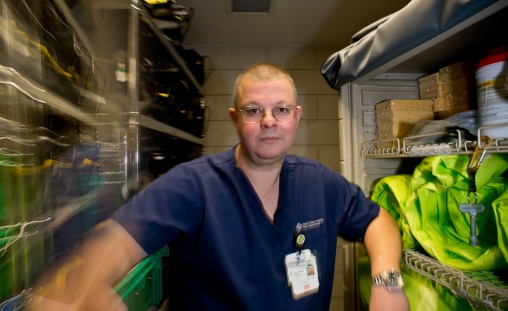
Wright State alumnus Jon Reichman thrives in the chaos of the ER at Miami Valley Hospital, where he also serves as the program coordinator of the Hazmat/Weapons of Mass Destruction Program.
A chaotic day is a normal day for an ER nurse.
One minute all of your patients are stable, the next a cardiac arrest comes in, followed by a stroke patient who needs a tPA to break up a blood clot in his brain. At some point, you check on your other patients and hope they’re still under control. Or you might return to find a patient who had been stable is now having a heart attack.
For Jon Reichman, the fast and sometimes-crazy environment is one thing that makes his job as an ER nurse at Premier Health Miami Valley Hospital fun.
“If you can manage chaos, and if you can manage going from zero to 60 in two seconds, then back to zero again, and do that day in and day out,” he said, “then the ER is a great place.”
There are days in the ER when every minute brings something new, and to care for your patients you must be able to adjust on the fly.
“We call it organized chaos,” he said, “but on some nights it’s just pure chaos.”
“When it’s very busy you can spend 12 hours in the ER and feel like you just clocked in,” he said. “And when it’s slow it feels like you’re in the ER for an eternity.”
Since graduating from the Wright State–Miami Valley College of Nursing and Health in 1990, Reichman has worked as a Registered Nurse at Miami Valley Hospital. He initially worked in medical-surgery, then oncology. When the hospital downsized to cut costs in 1993, Reichman chose to move to the ER. He hasn’t left.
Reichman enjoys working in the ER for multiple reasons. What makes him happiest is receiving letters from patients or their families.
“If a patient or a patient’s family takes the time to write a letter to say thank you to a nurse — whether it be me or any other nurse — that is the absolute best reward that you can get,” he said.
Working in the ER also allows him to meet many different kinds of people, from chief executives of Fortune 500 companies to war heroes to people who have made bad choices or who have had horrible things happen to them.
“One minute you can have a CEO in one bed,” he said, “and the next minute you can have a homeless person who’s just there for a turkey sandwich.”
In addition to working in the ER, Reichman serves as the program coordinator of Miami Valley Hospital’s Hazmat/Weapons of Mass Destruction Program, which trains ER staff to care for patients and have basic understanding of WMD, including biological, chemical and radiological substances. He also is certified as a hazardous materials technician and in radiological/nuclear operations by the U.S. Department of Justice’s Office for Domestic Preparedness. He has designed and offered training programs for his colleagues on
caring for someone who has been exposed to hazardous materials or WMD.
“If you have the correct knowledge, hopefully that calms down some of your fears,” he said. “Now you have the knowledge to care for those patients and not be so fearful, and be able to protect yourself so you don’t get hurt.”
Most of the hospital’s hazmat incidents have been industrial accidents or have involved individuals using chemicals, including acid and cyanide.
“There are chemicals in this area that if they got into the wrong hands could cause harm to lots of people, and we have to be ready to take care of that,” he said. “And that’s part of the training that we do.”
Reichman almost didn’t become a nurse. When he arrived at Wright State he had no idea what he wanted to do, but nursing wasn’t something he even considered. During his freshman year, he worked with a guidance counselor to help him determine his major and find a career path. He took some tests that said Reichman should go into nursing.
“And I’ll have to say that they were right,” he said.
Reichman takes pride in the care he provides for his patients. Your challenge as a nurse, he says, is to complete your task in a way that makes the patient see that you care.
“I’m used to being with my patients for under four hours,” he said. “The quicker I get them home, the quicker I get them upstairs, the happier the patients are.”
It takes nurses and doctors working as a team to give a patient the care that they need, he says. “That’s very rewarding,” he said.
“There’s not many jobs that I know of,” he said, “where at the end of the day you really feel like you’ve done something good.”

 Milling around
Milling around  Wright State recognizes Nursing Professor Kim Ringo for advancing international student success
Wright State recognizes Nursing Professor Kim Ringo for advancing international student success  Wright State honors graduating students for distinguished doctoral dissertations
Wright State honors graduating students for distinguished doctoral dissertations  Top 10 Newsroom videos of 2025
Top 10 Newsroom videos of 2025  Museum-quality replica of historic Hawthorn Hill donated to Wright State
Museum-quality replica of historic Hawthorn Hill donated to Wright State 